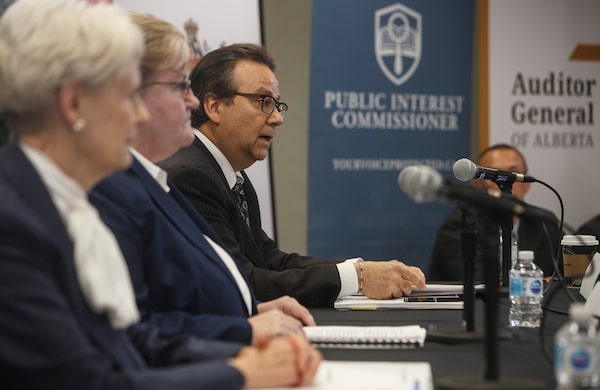
Ethics Commissioner Marguerite Trussler, left, Alberta Public Interest Commissioner Marianne Ryan and Alberta Auditor General Doug Wylie speak about their findings from their respective independent investigations into the activities related to the International Centre of Regulatory Excellence at the Alberta Energy Regulator, in Edmonton on Oct. 4, 2019.JASON FRANSON/The Canadian Press
The former chief executive officer of Alberta’s energy regulator set up a pricey side project that diverted resources, money and employee time from the agency while concealing many of the details from the board of directors, provincial investigations have concluded.
Jim Ellis, who left the Alberta Energy Regulator late last year, came under investigation from three separate provincial bodies after a whistleblower complaint about the development of an international consulting business. Mr. Ellis established the company with some of his senior staff while they were executives at the regulator, investigators said.
Alberta’s Public Interest Commissioner (PIC) said Mr. Ellis grossly mismanaged public funds when he set up an operation called the International Centre of Regulatory Excellence, or ICORE. Further, he mismanaged public assets and services by misappropriating intellectual property, the commissioner wrote in a report released on Friday.
“Mr. Ellis’s actions constitute a willful and reckless disregard for the proper management of AER funds,” the commissioner said in a detailed report on the investigation.
Mr. Ellis is a onetime Canadian Forces officer and former deputy minister in the provincial government who became the AER’s first CEO in 2013. He was also investigated by the Ethics Commissioner and the Auditor-General, who released their own reports on Friday.
Mr. Ellis could not be reached for comment after the release of the reports.
The investigations detail how the most senior executives at the energy regulator were distracted from the agency’s crucial tasks of vetting and approving energy projects as the industry’s financial fortunes dwindled amid a lengthy downturn. At the same time, the province struggled to deal with a rising tide of environmental liabilities tied to aging oil and gas wells.
According to the PIC report, Mr. Ellis established ICORE in July, 2016, with the intent of providing training to other countries on energy regulation. He and his allies subsequently set up affiliated entities, including a not-for-profit corporation to deliver the services. Mr. Ellis was a director.
ICORE had a showy public launch in early 2017, with an event in Mexico City that included the federal energy ministers of Mexico and Canada, alongside Mr. Ellis.
The AER described itself as a founding member of ICORE and said it would provide in-kind services under what it called a “strategic partnership."
ICORE charged other jurisdictions, including Mexico, for its services, but also used the resources of the AER in delivering them, according to the findings, which include text messages between Mr. Ellis and a colleague that show how expenses related to ICORE were concealed. In addition, Mr. Ellis sought to commercialize a computer-based regulatory system that had been developed at the AER, the PIC report said.
Mr. Ellis told government officials and the AER’s board that ICORE was meant to enhance the stature of Alberta’s regulator, but the Ethics Commissioner concluded that his true goal was to create future work and contracts for himself and senior officials from AER after they left the regulator.
Ethics Commissioner Marguerite Trussler said that while Mr. Ellis maintained that he had done no wrong over two days of questioning, her office confronted him with text messages that she said revealed his intent. “As much as he was trying to say this was for the government and AER’s benefit, in fact it was very hard to respond to what was in the text messages, that this was for his own benefit,” Ms. Trussler told reporters Friday.
Mr. Ellis left the AER last November, and the agency has since operated under an interim CEO, Gord Lambert.
In early September, Alberta Premier Jason Kenney’s government replaced the AER’s entire board as a first step in launching a review of the regulator.
“It is clear now that a small group of senior leaders used AER resources in a way that is unacceptable,” the new AER board said in a statement.
Auditor-General Doug Wylie found that ICORE strained AER’s resources during a time when the provincial regulator’s attention, as well as that of its chief executive, were needed at home. More than 50 employees were seconded to ICORE’s development over a number of years, including two senior executives at the provincial agency who were moved full-time to the private company. “While the former AER CEO did not log the time that he spent on ICORE, the evidence shows that it was considerable,” concluded the report.
A significant amount of travel for ICORE was also conducted on the public dime, disguised internally as “AER reputation building,” according to the Auditor-General. Over three years, Mr. Ellis and a senior AER executive billed the regulator $200,000 in airfare and hotel bills for ICORE work.
Public Interest Commissioner Marianne Ryan, who was previously commanding officer of the RCMP in Alberta, said she was struck by the “atmosphere of arrogance and on the other hand, a culture of fear” created at the regulator by top officials who she said were complicit in wrongdoing.
ICORE’s development is estimated to have cost the AER $5.4-million, of which $3.1-million has so far been recovered by the regulator. The Public Interest Commissioner and Auditor-General warned that more money could have been spent by the public agency on the private operation than revealed in records. They said that the records were altered to mask the amounts.
Investigators said there was no evidence that Mr. Ellis personally benefited from any of the funds and that they were not recommending criminal charges as a result.
We have a weekly Western Canada newsletter written by our B.C. and Alberta bureau chiefs, providing a comprehensive package of the news you need to know about the region and its place in the issues facing Canada. Sign up today.